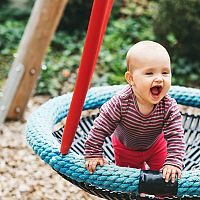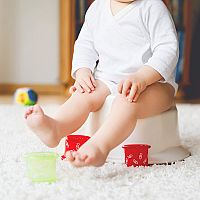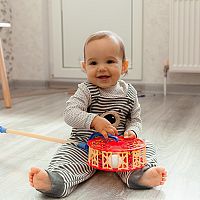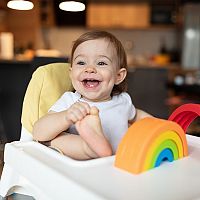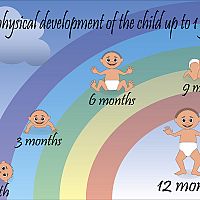
12-month-old baby (child) - development, diet, sleep, exercises, toys. See what it can do
1 year, 12 months, i.e. 365 days have passed since the day the child saw the light of day. A tired newborn has turned into an eager infant and is now turning into a toddler. From a fearful little one, he becomes an "independent", curious and somewhat selfish child who wants to explore even more than ever before. A one-year-old child has gone through many changes and made progress that allowed him to better understand his surroundings, learn about the world on his own, discover and develop. This process will continue further. However, a 12-month-old baby is already a child whose development will progress from week to week. Active sitting, chattering, first words and maybe even the first steps on two legs. In the 12th month, he perfects what he has learned so far.
At the end of the 12th month, the child can manage several movement creations, from going on all fours to standing up from kneeling on two legs with support (couch, chair, table) to the first independent steps. Those who are physically more skilled even manage to walk independently, even if their balance is still weak in places. A misunderstood "selfishness" often appears in a toddler, because he feels that everything and everyone is there for him. So he can get offended, angry, and often starts an avalanche of tears just because he doesn't get what he wanted. Right education is already starting to be a topic at this moment. A 12-month-old toddler can already drink from a cup and sometimes successfully puts a spoon in his mouth. Although the child is self-centered, this is not a sign of selfishness. A child understands disproportionately more than he can say. However, communication has many forms. When developing a child, always think about what he has and can know at a given age.
What can a 12-month-old baby do?
Despite the fact that you have followed the child for 12 months and observed his progress, you can expect to see even more "improvements" at the end of the 12th month. As part of gross motor skills, the child is already sitting, walking on all fours, and may be able to stand next to the furniture. Take steps to the sides or take the first independent steps. With your help, when you hold the child's hand, he will be able to take steps and gradually improve the technique. Waiting for the first step often makes parents nervous, but it is not a rule that the child must walk for sure in the 12th month. In some cases, at this age, the child is just starting to become quadrupedal. Do not forget to praise the child at every progress. He can carefully sit down from a standing position, although you can't be surprised by a sharp fall on his ass. During this period, the child becomes familiar with typical pains , falls, bumps and the like. Safety is important, but excessive caution is more harmful.
The grip is also strong enough, the child can easily pull or push away. The movements of the hands are coordinated and the hand is directed towards the object that the child wants to grasp. A sign of the rise of intellect is that the child adjusts his grasp to the size and shape of the object, he can even use both hands to grasp it. The child can place the cube in the toy chest instead of throwing it. So the subject leads exactly where he wants to put it. He can drink from a cup and even during feeding he can put a spoon in his mouth (not always successful). Faster children manage to build building blocks (cube by cube) even at the 12th month. The coordination of movements and the ability to understand space prove that the child can hold a container while bathing and pour water into it with a glass.
It is generally expected that a child's first step can appear around 9-10 months. Subsequently, after the first step, this movement develops, the child progresses even with help. However, it is still true that the first steps and independent walking are very individual. Careful independent steps and subsequent falling onto the bottom or controlled sitting may be present in children at 11-12 months. Independent walking, in which the child stands on two legs, takes steps forward, can stop and change direction, is expected by 17-18 months. The development of walking continues. However, this is only a broader norm, which may not be far from authoritative. Definitely do not compare children and do not follow tables. Successful attempts to take the first steps at 12 months are not a condition.

12-month-old child - cognitive abilities and speech
At 12 months, a child, especially when he manages to move around in space by himself , begins to realize his independence. It requires its own space. He is even able to play alone for a certain period of time. He notices what the people around him do, intensively imitates. He knows exactly that if mom is cooking, he will be "ham-ham". He knows when dad comes home from work and will demand his attention right away. You can be sure that at this age the child is already thinking and inventing even more. Self-confidence grows and the child dares to move away from his parents.
Thanks to the development of motor skills , he feels the need to be actively involved, cook with mom, repair with dad, etc. It imitates many activities. He experiences games so much that he often imitates situations he perceives with his senses with toys. A shift in the cognitive level can also be seen in the fact that playing with a doll, dog or teddy bear takes on realistic dimensions and the toy suddenly needs care. A toddler also likes to express his feelings, he has no problem giving a kiss or waiting for a hug. The mutual relationship and bond with the parents, especially with the mother, deepens.
The child is at least partially beginning to realize that the other person can experience pain or sadness. Just watch the baby's reaction if you imitate crying. The reaction of a one-year-old child is often relatively selfish or egoistic , the child wants the world to be according to him. If not, significant anger and crying are typical responses. Here it is necessary to know how to set boundaries and determine prohibitions. However, the child is not really selfish , he simply does not understand his feelings and the reactions of others. The emotional child continues to mature. In the professional literature, this period is also referred to as the first period of defiance. Although it is more typical around the age of 2 to 3 years, the first period of defiance can be present already.
The passive vocabulary is already wider, the child understands many words he hears. Especially if it concerns the naming of specific objects. Speech development is very individual, just like movement and walking. The first words - interjections are expected from the child around 9-12 months. In about 1 year, the child could actively use 5 to 20 words like ta-ta, ma-ma, ba-ba, pa-pa, tam, boom and the like. The important thing is that the child starts assigning meaning to them. Speech expression is more pronounced in some toddlers at this age and they chatter happily, others catch up with this area of development later and there is nothing wrong with that. Deviations can be indicated by the pediatrician during regular visits. Do not forget to always tell him about all the progress and failures of the child.

12-month-old child - diet and menu
Just as the child is proactive and independent in movement and can play alone with toys, his autonomy should be supported in the area of eating. A one-year-old toddler should already be able to drink from a cup and hit his mouth with a spoon during feeding. The fact that he will prefer his hands when feeding larger pieces is not a bad thing, it shows that the child is thinking and prefers an easier option to satisfy his need. The child's taste buds are already relatively sensitive and the child knows what he likes and what he doesn't. Patience of parents is therefore a must. Do not add salt or spices to side dishes. Preparing recipes for a 12-month-old baby is less monotonous, because the diet is more varied and there is a large amount of ingredients that the baby already consumes in snacks. Don't be afraid of baked goods, hard-boiled eggs and dairy products either.
When introducing new foods into the diet, even in the case of potential allergens, be careful and watch for signs of an allergic reaction for the following 2-3 days, this applies to cow's milk, soy, chocolate, nuts, citrus fruits, poppy seeds, strawberries and so on. The child's milk teeth are still growing, but cooked meat is no longer a problem for the child. Breast milk can still be part of the diet. Either from the breast or sucked into a bottle. Alternatively, it can be artificial infant milk.
Why does a 12-month-old baby not want to eat?
There can be more reasons why a 12-month-old child refuses to eat. Typically, loss of appetite in toddlers manifests itself in the period when the child is teething. The gums are then sensitive, and if the child is bothered by pieces of fruit, vegetables or meat, go back to mushy - mixed food or bet on breastfeeding or artificial infant milk. You can try pieces of bread or thick vegetable soups. The reason for loss of appetite can also be an illness, such as flu, angina or headache. Therefore, observe other symptoms that may indicate that the child is experiencing an illness - nasal discharge, increased body temperature, cough, and the like. After turning 1 year old, you can let your child try the dishes you cook for "adults", but still try to limit the seasoning.
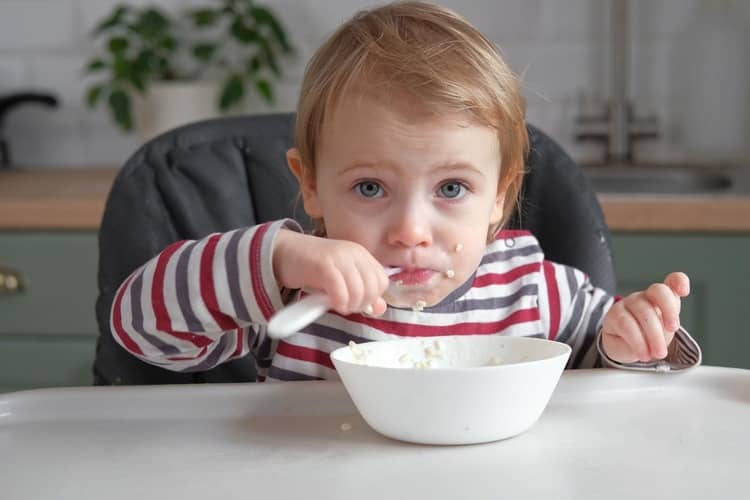
Sleep and games for a 12-month-old baby
The sleep of a one-year-old baby is more or less influenced by the sleep cycle or secondary factors. A child at this age can already have a relatively calm and undisturbed sleep. As for daytime naps, the need for daytime naps decreases. Most children switch to one sleep mode during the day , lasting 1.5 to 2 hours. Normally, however, there can still be two such naps, in the afternoon and around the afternoon. At night, the child should sleep 10 to 12 hours.
Sleep can be disturbed by hunger, bad dreams, tossing and turning, teething or illness. This turning point can also be characterized by sleep regression, which is related to the development of the baby's body. The child may refuse to sleep during the day, as a result he is tired, tearful, moody and irritable . Frequent awakening from sleep is a typical symptom. Sleep regression usually subsides within 2 weeks, and it takes a while for the sleep pattern to stabilize
The game with a one-year-old child is already a bit more interactive. In addition to the fact that the child can already play with the toys by himself, the help of the parent during the game is always welcome. Children are fascinated by picture books, they enjoy imitations, which teach them a lot at the same time. The child understands prompts, if you want him to give you "car - brm-brm", he can understand it. He also understands prohibitions, although he does not always respect them. Children do not like to play with their peers yet, because they do not understand what they want. Stubbornness and selfishness can sometimes surprise you - the reluctance to lend a toy is "dramatic". And here, during the game , the educational role of the parent comes into play and the sensitive explanation that it can be divided and play with another toy.
And what other games can you play with a 1-year-old child? Play in front of the mirror, pass toys from hand to hand, hide toys, stack cubes, put toys in boxes, play geometric puzzles with your child or play with a ball. Let the child throw the ball, kick it, etc. The child no longer has such a tendency to put everything in his mouth, and outside the period of teething, the amount of saliva also decreases. Communicate intensively with the child, talk to him, show him objects, describe them. Swings, a sandpit or even a bouncer are also suitable for playing.
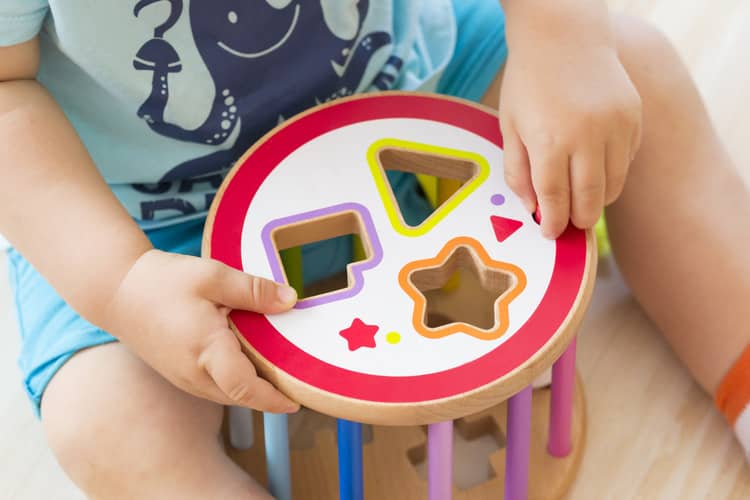
The most frequent questions - FAQ
Do you remember what your child already knew in 1 year? Do you currently have a 12-month-old child at home? What is characteristic of a one-year-old toddler? Share your experiences, stories and incidents that you have experienced with your children. How did your 12-month-old sleep? Did you have problematic development in a 12-month-old child? Perhaps your one-year-old child has already walked or spoken his first words, or had a problem with climbing or motor skills. In the discussion under the article, you can help many parents with advice or calm their exaggerated fears. We will be glad for your opinion.
What is the ideal weight of a 12-month-old child?
What if a 12-month-old child does not sit?
Why isn't a 12-month-old child talking yet?
Gallery
Pridať komentár


